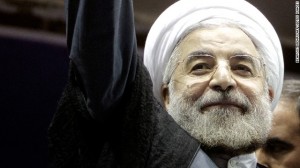 President reveals a new, progressive attitude to internet censorship in reply to tweet from Twitter boss Jack Dorsey
President reveals a new, progressive attitude to internet censorship in reply to tweet from Twitter boss Jack Dorsey
President Hassan Rouhani says his efforts are geared towards ensuring Iranians can access all information online and use it. Photograph: John Minchillo/AP
Iran's president, Hassan Rouhani, has reassured Twitter's co-founder, Jack Dorsey, that he will work to make sure Iranians have access to information globally in what appears to be a reference to reducing online censorship.
Dorsey started the conversation on Tuesday, asking the internet-savvy leader if people of his country could read tweets posted by their own president, implicitly referring to the filtering of social networking websites in the Islamic republic. Twitter and Facebook are among at least 5 million sites blocked in Iran.
"Good evening, President. Are citizens of Iran able to read your tweets?" Dorsey posted on his Twitter account, @jack, which is followed by nearly 2.5 million people.
Within hours, Rouhani replied, saying: "Evening, @Jack. As I told @camanpour, my efforts geared 2 ensure my ppl'll comfortably b able 2 access all info globally as is their #right."
Evening, @Jack. As I told @camanpour, my efforts geared 2 ensure my ppl'll comfortably b able 2 access all info globally as is their #right.
— Hassan Rouhani (@HassanRouhani) October 1, 2013
The Iranian president was referring to his interview with CNN's Christiane Amanpour in which he pledged to deliver his election campaign promises in regards to people's access to internet.
Rouhani, who has maintained an active social presence since campaigning for office, has taken a softer line on web censorship, describing social networking sites such as Facebook as a welcome phenomenon. Rouhani's twitter account is believed to be run by a close associate.
Asked by Amanpour if he would work to reduce censorship in Iran, he replied: "All my efforts are geared to ensure that the people of Iran will comfortably be able to access all information globally and to use it. There are large social networks at a global level around today. And I believe that all human beings have a right, and all nations have a right to use them."
In a public challenge to filtering in the Islamic republic, Rouhani's administration has embraced social networks, particularly the foreign minister, Mohammad Javad Zarif, who has engaged with his followers on Twitter, @jzarif, as well as on his Facebook page.
In his CNN interview, Rouhani, without referring to filtering, said countries might have ethical and moral concerns and might adhere to a framework.
"One of my plans is to reduce the problems that people face currently on these issues, so that within those sort of moral frameworks that we have for ourselves, that we are able to access these social network sites," he said.
In response to Rouhani's tweet, Dorsey posted: "thank you. Please let us know how we can help to make it a reality."
Rouhani does not have full authority to rescind filtering alone as such decisions rests in the hands of the country's internet big brother, the supreme council on cyberspace, which was set up last year at the request of the supreme leader, Ayatollah Ali Khamenei, to police the activities of Iranians online. Rouhani chairs the council but does not have the final say as it also includes members of other institutions including parliament and the elite Revolutionary Guards. However, since Rouhani was sworn in to office in August, Iranians have reported an improvement in the speed of internet and a relative relaxation of restrictions.
By The Guardian
The Iran Project is not responsible for the content of quoted articles.

 QR code
QR code